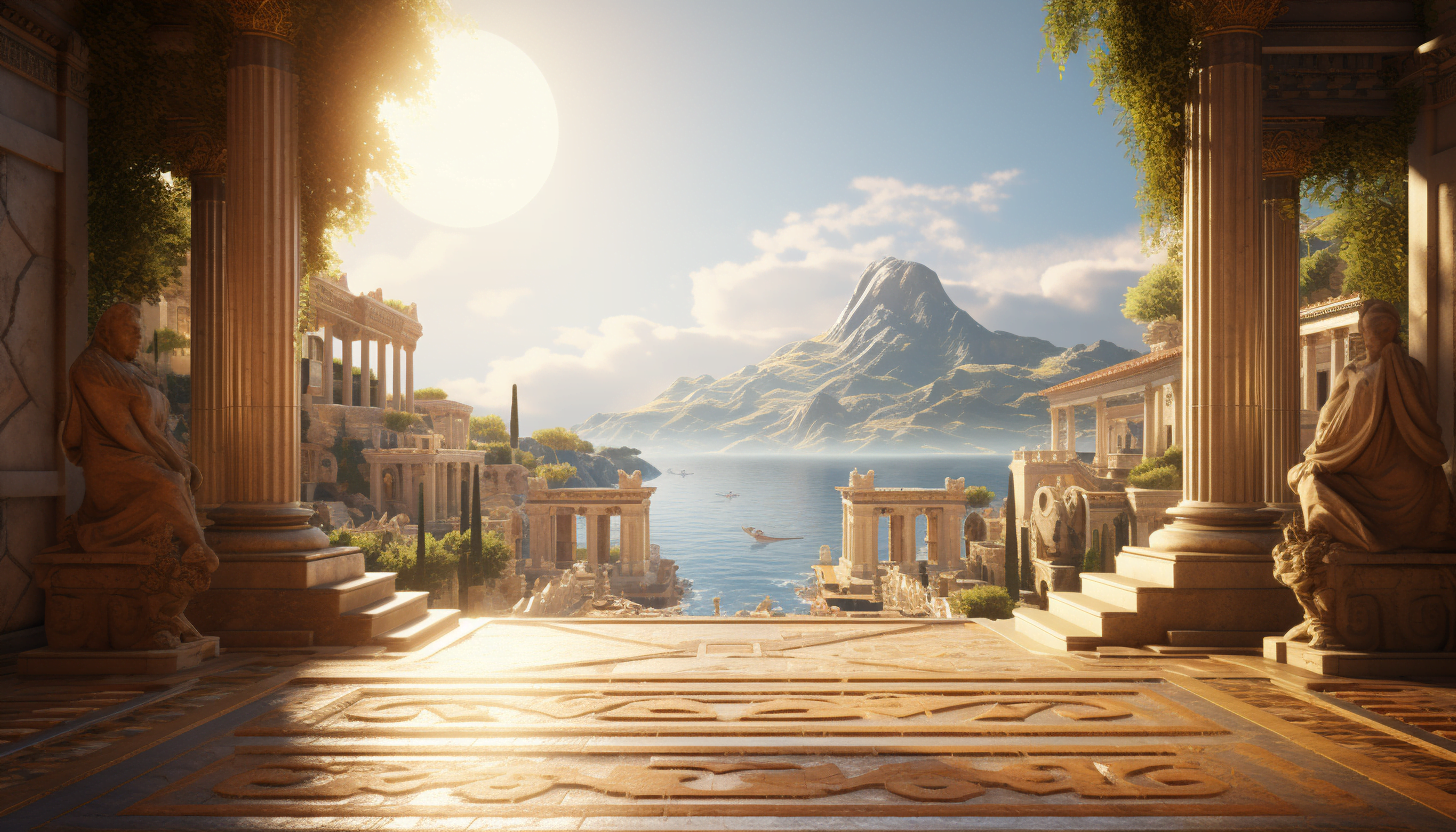Ancient Greece is renowned for its rich history and influential figures who shaped the world as we know it today. One such individual is Alexander the Great, a legendary conqueror who left an indelible mark on ancient history. In this article, we will delve into the life of Alexander the Great, focusing on some of the key events and significant moments that occurred before his reign. From his birthplace to his notable victories, we will unravel the captivating story of this extraordinary leader.
Explore the Wonders of Ancient Greek City-States: Delve into the rich history of these remarkable civilizations in our article Ancient Greek City-States: Unraveling the Marvels of the Past.
1. Where Was Alexander the Great From?
Alexander the Great was born in Pella, the ancient capital of Macedonia, in northern Greece. His father, King Philip II of Macedon, ruled over this region, establishing a strong foundation for Alexander’s future endeavors. Growing up in a royal household, Alexander received a comprehensive education under the guidance of renowned philosophers, including Aristotle. This upbringing played a pivotal role in shaping his intellect and strategic thinking, laying the groundwork for his remarkable achievements.
2. Bucephalus
In his youth, Alexander formed a deep bond with his horse, Bucephalus. Legends tell of Alexander taming the wild stallion that no one else could handle, showcasing his determination and unwavering spirit. Bucephalus became Alexander’s faithful companion throughout his conquests, symbolizing their unbreakable bond. The horse served as a constant reminder of Alexander’s fearless nature and unwavering commitment to his ambitions.
3. Alexander Becomes King
At the age of 20, tragedy struck the Macedonian kingdom when King Philip II was assassinated. As the rightful heir, Alexander ascended to the throne, facing numerous challenges and power struggles during his early reign. However, with his natural leadership skills and military prowess, he swiftly consolidated his power, gaining the loyalty of his subjects and establishing himself as a formidable ruler.
4. How Alexander the Great Conquered the Persian Empire
One of Alexander’s most remarkable achievements was his conquest of the Persian Empire, a feat that forever altered the course of history. Beginning in 334 BCE, Alexander embarked on a campaign to vanquish the Persians, known as the Great Persian Expedition. Employing a combination of tactical brilliance, advanced military strategies, and an unwavering belief in his abilities, Alexander led his army to victory in multiple major battles, including the Battle of Granicus and the Battle of Issus.
5. Gordian Knot
Legend has it that during his journey to Asia, Alexander encountered the famous Gordian Knot, a complex knot that was seemingly impossible to untie. Faced with this challenge, Alexander demonstrated his unique problem-solving skills by cutting through the knot with his sword instead of trying to unravel it. This bold action showcased his innovative approach and unwillingness to be restricted by conventional norms, embodying the audacious spirit that defined his character.
6. Battle of Issus
The Battle of Issus marked a pivotal moment in Alexander’s campaign against the Persians. In 333 BCE, Alexander’s forces clashed with the Persian army, commanded by King Darius III himself. Despite being vastly outnumbered, Alexander’s strategic brilliance and the unwavering loyalty of his soldiers secured a resounding victory for his forces. This triumph not only solidified his foothold in Asia but also propelled his reputation as an invincible conqueror.
7. Battle of Tyre
The Battle of Tyre stands as a testament to Alexander’s unwavering determination and ingenuity. In 332 BCE, he besieged the island city of Tyre, which posed a significant obstacle to his advancement. Despite the city’s strong fortifications and resistance, Alexander devised a groundbreaking solution. He constructed a causeway, connecting the mainland to the island, thus bypassing the city’s navy and eventually securing victory. This remarkable feat further solidified his reputation as a military genius.
8. Did Alexander the Great Arrange His Father’s Murder?
The circumstances surrounding the death of King Philip II, Alexander’s father, have long intrigued historians. Some theories speculate that Alexander may have been involved in his father’s assassination. However, conclusive evidence to substantiate these claims is lacking. While the exact truth may forever remain a mystery, it is important to approach such conjectures with the understanding that history often conceals more than it reveals.
9. Alexander Enters Egypt
In 332 BCE, Alexander’s conquest brought him to the Egyptian shores. The Egyptians, weary of Persian rule, welcomed him as a liberator. Enamored by the ancient land’s mystique and rich history, Alexander founded the city of Alexandria, which would go on to become a significant cultural and intellectual center of the ancient world. This pivotal moment solidified his influence in the region and set the stage for further conquests.
10. Alexander Kills Cleitus
Despite Alexander’s extraordinary achievements, his path to greatness was marred by moments of controversy and tragedy. One such incident involved Alexander’s companion and trusted general, Cleitus. During a heated argument, Alexander, overwhelmed by his emotions, impulsively killed Cleitus. This act of anger and remorse highlighted the complexity of Alexander’s character, serving as a poignant reminder of the volatile nature of power and the toll it can take on even the greatest leaders.
Ancient Greece: A Legendary Civilization
[youtube v=”6bDrYTXQLu8″]
The civilization of ancient Greece, which emerged around 4000 years ago, is renowned for its numerous achievements in art, philosophy, democracy, and heroism. Over the course of more than a millennium, ancient Greece expanded its influence from the shores of the Aegean Sea to lands as far west as Spain and as far east as India. Despite the eventual decline of their empire, the legacy of ancient Greece continued to resonate in the realms of politics, culture, and military prowess.
Political Achievements
Unlike many other nations with unified rule, ancient Greece was composed of more than 1500 territories known as city-states. Each city-state acted as a sovereign nation, with its own rulers and occasionally engaging in conflicts with one another. However, a significant political development occurred in Athens—the birthplace of democracy. Here, the Greeks established the first large-scale democratic system. This form of governance allowed citizens to have representation and political power, a significant departure from the autocratic rule prevalent at the time.
Military Power
The ancient Greeks also gained a formidable reputation for their military might. Their military’s primary role was both to expand the Greek Empire by establishing colonies overseas and to protect Greece itself from foreign invaders, such as the Persian Empire. In the face of external threats, city-states united to defend their homeland. Among the Greeks, the city-state of Sparta, in particular, took great pride in its military and regarded its soldiers as heroes. These acts of heroism often became the stuff of legends, immortalized in literary works like the Iliad. In fact, the valor of these war heroes led to the creation of the Olympics, an event that celebrated physical competition—a testament to the deep-rooted significance of physical prowess in ancient Greek society.
Cultural Contributions
Ancient Greece’s cultural contributions have left an indelible mark on the Western world. Notably, Greek art and architecture are held in high regard. The ancient Greeks were known for their incredible sculptural works, including standing figures and reliefs. Additionally, they developed three distinct types of columns—Doric, Ionic, and Corinthian—that were incorporated into structures like the iconic Parthenon. These artistic achievements were imitated by civilizations worldwide and continued to influence artistic expression for thousands of years.
Intellectual Influence
The ancient Greeks’ interpretation of the world had a profound impact on various aspects of human civilization. Greek religion, characterized by numerous anthropomorphic deities, shaped the spiritual beliefs of other cultures, including the Etruscans and the ancient Romans. Greek philosophy, on the other hand, delved into matters of reason, ethics, and natural law. These philosophical inquiries influenced later civilizations’ achievements in politics and science, serving as a foundation for intellectual development.
Linguistic Legacy
The ancient Greeks’ language, known as ancient Greek and over 3400 years old, has had a lasting impact on the development of modern languages. Many contemporary languages, including English, have thousands of words that originate from Greek roots. The influence of ancient Greek on language further demonstrates the civilization’s far-reaching significance.
In conclusion, the legendary civilization of ancient Greece encompasses a multitude of achievements that have shaped world history. Through their political innovations, military prowess, cultural contributions, intellectual influence, and linguistic legacy, the ancient Greeks have left an indelible mark on the Western world and beyond. The influence of ancient Greece has persisted for millennia, solidifying its place as one of the most revered civilizations in history.
Conclusion
Alexander the Great’s life was a tapestry woven with triumphs, controversies, and captivating moments. From his birthplace in Pella to his notable victories and personal struggles, his legacy remains etched in history. Through his unparalleled military conquests and his visionary approach, Alexander not only expanded the boundaries of Greece but also ushered in a new era of cultural exchange and advancement. His extraordinary journey continues to inspire and captivate generations to this day.
- Crypto Quotes’ Red Flags: Avoid Costly Mistakes - June 30, 2025
- Unlock Inspirational Crypto Quotes: Future Predictions - June 30, 2025
- Famous Bitcoin Quotes: A Deep Dive into Crypto’s History - June 30, 2025
















